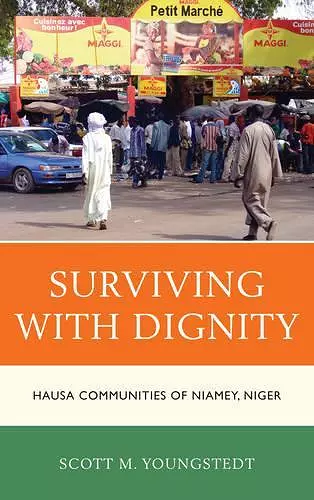Surviving with Dignity
Hausa Communities of Niamey, Niger
Format:Hardback
Publisher:Bloomsbury Publishing PLC
Published:13th Dec '12
Currently unavailable, and unfortunately no date known when it will be back

Surviving with Dignity explores three key interconnected themes—structural violence, suffering, and surviving with dignity—through examining the lived experiences of first and second-generation migrant Hausa men in Niamey over the past two decadesin the current neoliberal moment. Colonialism, state mismanagement, structural adjustment, and global neoliberalism have inflicted structural violence on Nigeriens by denying them human and particularly socioeconomic rights and relegating them to a status at—or very near—the bottom of UN Human Development Index in each year of the past decade. As a result of structural violence, most Hausa of Niamey suffer grinding and intractable poverty that has intensified over the past two decades. Suffering is a recurrent and expected condition; it is the normal condition.The central goal of the book is to explain the material (migration and informal economy work) and symbolic (meaning-making) strategies that Hausa individuals and communities have deployed in their struggles not only to literally survive in the face of economic austerity on the outer periphery of the global economy, but also to survive with dignity. Despite daunting challenges, many Hausa men find strength and patience in their humble devotion to Islam, cherish their vibrant sociability and gracious hospitality, deeply value extraordinary conversational virtuosity and knowledge, deploy humor in complex transcendent, defensive and self-critical ways, perpetuate a sense of hope and optimism for the future, articulate their own modernities, and strive relentlessly to feel connected to the modern world at large. Extreme poverty created by socioeconomic injustice constitutes an unacceptable assault on human dignity. Hausa men’s remarkable strength does not negate the reality of the socioeconomic injustices they face. Their dire poverty in a world of plenty is unacceptable even when they handle it gracefully.
Youngstedt describes the urban realities of first- and second-generation Hausa migrants in Niamey, Niger. Basing his work on over 20 years of ethnographic research, Youngstedt uses participant-observation, structured interviews, case studies, key informants, and the Internet to gather data about Hausa men in Niger, northern Nigeria, Ghana, Senegal, New York City, and Michigan. He shows Niamey as a city that has grown in population and ethnic diversity over the past 20 years while suffering economic decline. Its youth population is strongly influenced by modern technologies: radios, cell phones, video culture, the Internet. Youngstedt focuses on men's informal and formal conversation groups as mechanisms for handling the injustices ensuing from colonialism, state mismanagement, structural adjustment, global neoliberalism, and the overwhelming poverty of the capital city. These groups offer adaptive strategies for surviving with dignity and successfully connecting with the modern world. By means of case studies of people he has known for a long time, the author offers important insight into the life of Niamey men. Summing Up: Recommended. Upper-division undergraduates and above. * Choice Reviews *
Youngstedt’s clear and compelling narratives demonstrate how the everyday confrontation with urban poverty can result in an admirable social resilience. Youngstedt also illustrates how the power of ethnography can be used to represent a complex social reality that defies systematic reduction. This book is a model of and for contemporary ethnography, African studies, and urban anthropology. As in all good books, when you reach the final pages of Surviving with Dignity , you will be sad that your reading experience has come to an end. * African Studies Review *
Surviving with Dignity is Scott Youngstedt's deeply humanistic and moving portrait of the trials and tribulations of Hausa men in Niamey, the capital city of the world's poorest country. Youngstedt's book is based upon a more than 20 year period of fieldwork in Niger. Given this enviable record of field research, the text is nuanced and sensitive. Accordingly, it describes without sentimentality the challenges of daily life in a space of deep and intractable poverty. But Youngstedt does not reduce poverty—or dignity—to a statistical profile or a discourse of disembodied analysis. Instead, he skilfully tells a wide range of stories that evoke the myriad existential challenges that his Niamey friends have confronted and struggled to overcome—with a measure of dignity. This ethnographic portrait of contemporary urban life in West Africa is a necessarily complex one. Guided by Youngstedt's clear and compelling narratives, the complex themes of urban poverty and social resilience weave together into a seamless whole. Surviving with Dignity clearly demonstrates the power of ethnography to represent a complex social reality that defies systematic reduction. This book is a model of and for contemporary ethnography, African studies and urban anthropology. -- Paul Stoller, Professor of Anthropology, West Chester University
Scott Youngstedt’s aptly named Surviving with Dignity explores the gendered and generational quality of modernity in Niamey by drawing upon the reflections of men in a variety of homosocial conversation groups. For Hausa immigrants in Niger’s capital Niamey who are caught in a kind of continuous liminality between rural and urban conversation groups provide a space for adapting to and interpreting a world in movement. Communications revolutions from the opening up of print and radio media to the explosion of use of cell phones have contributed to the dynamism of life in contemporary Niger without supplanting the value placed upon good conversation. With humanity and gentle humor Youngstedt renders in vivid terms the predicaments of men in a perilous economy who nevertheless find social and cultural resources to constantly regenerate a world worth preserving. -- Barbara Cooper, Rutgers University
ISBN: 9780739173503
Dimensions: 235mm x 159mm x 24mm
Weight: 508g
252 pages